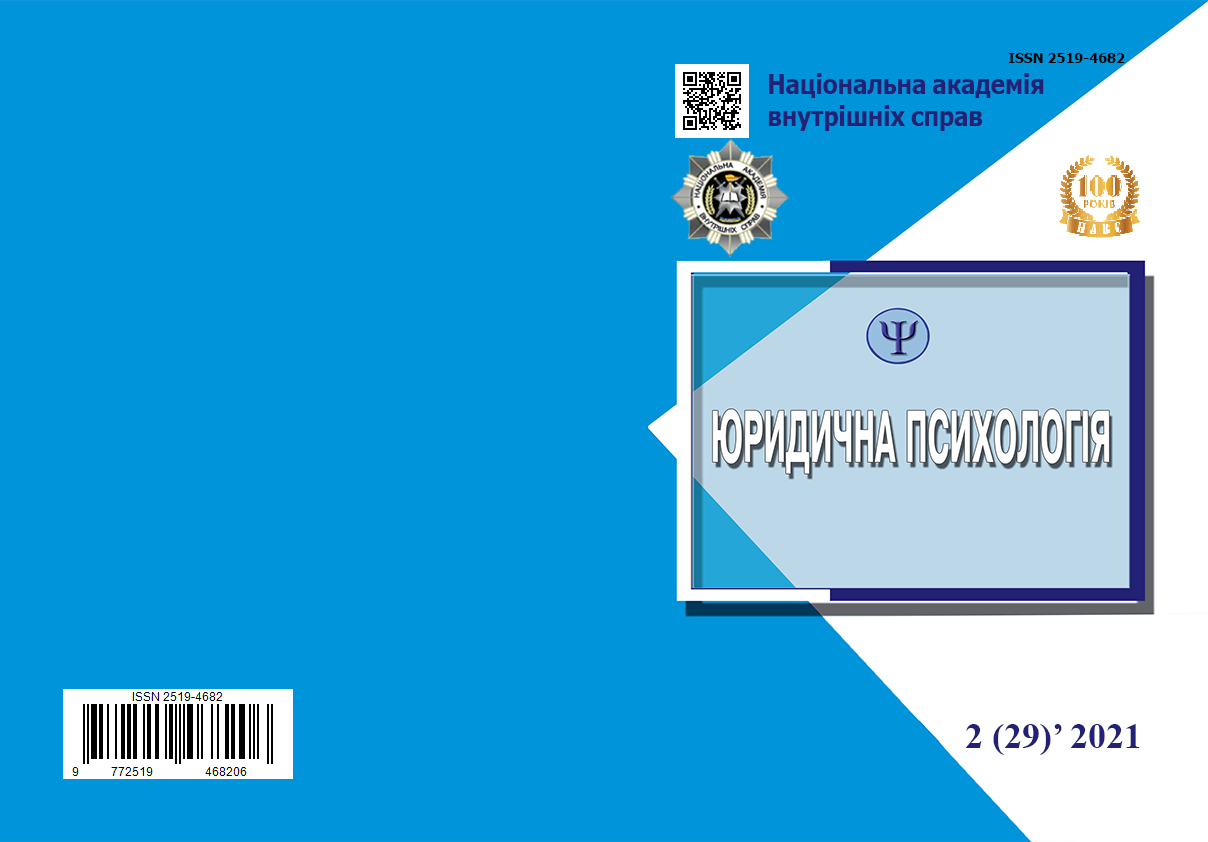Conceptual Principles of Psychocorrection Addictive Behavior of Minors
Abstract
The purpose of the study is to determine the conceptual foundations of psychocorrection of addictive behavior of minors. Methodology. The methodological tools were a general theory of social deviations, based on both differentiation and integration of existing knowledge in different fields. On this basis, the essence of addictive behavior is determined, which is expressed in the desire to depart from reality by artificially changing their mental state and is the result of impaired adaptation to new environmental conditions, deviates from social norms and does not meet generally accepted standards of behavior. , biochemical, social and individual psychological factors. The scientific novelty of the article is to highlight the principles of psychocorrection of addictive behavior, taking into account the analysis of its factors and mechanisms. The necessity of application of integrative models of psychocorrection with priority of psychological correction of causal type approximately to age and individual features of the client is substantiated. Conclusios. The complexity of the factors of addictive behavior in the combination of biological and social factors require the definition of conceptual foundations in the development of psychocorrectional influences, first of all, the leading principles of psychological correction. Conceptual principles of psychocorrection involve the use of various psychotherapeutic approaches aimed at restructuring the personality. Strategies for psychocorrection of adolescent addictive behavior should be selected individually, depending on what becomes a priority in determining the causes of interpersonal conflict. The influence of the environment is crucial in this process. The prospect of further research is the development of psycho-correctional programs for various types of addictive behavior of adolescents.Keywords: addictive behavior; dependence; addictive agent; psychotherapeutic approaches; psychocorrection; integrative models of psychotherapy.
Downloads
References
Карпинский К. В. Психологическая коррекция смысловой регуляции жизненного пути девиантной Диагностика предрасположенности к скуке: адаптация русскоязычной версии BPS-SR личности : монография. Гродно : ГрГУ, 2002. 139 с.
Kulikova T. I., Maliy D. V. The correlation between a passion for computer games and the school performance of younger schoolchildren. Psychology in Russia: State of the Art. 2015. No. 8 (3). Р. 124−136. doi: https://doi:10.11621/pir.2015.0310.
Ларченко М. О. Моделі залежної поведінки та пов’язані з ними фактори кримінологічного ризику. Юридичний науковий електронний журнал. 2020. № 4. С. 256–259. doi: https://doi.org/10.32782/2524-0374/2020-4/62.
Менделевич В. Д. Зависимость как психологический и психопатологический феномен (проблемы диагностики и дифференциации). Вестник клинической психологии. 2003. № 2. С. 153–158.
Молчанов С. В., Алмазова О. В., Войскунский А. Е., Поскребышева Н. Н. Роль личностных особенностей подростков в переработке социальной информации в интернет-коммуникации. Национальный психологический журнал. 2018. № 4 (32). С. 3–15. doi: https://doi:10.11621/npj.2018.04001.
Молчанов С. В., Алмазова О. В., Поскребышева Н. Н. Когнитивные способы переработки социальной информации из Интернет-сети в подростковом возрасте. Национальный психологический журнал. 2018. № 3 (31).
С. 57–68. doi: https://doi:10.11621/npj.2018.0306.
Молчанов С. В., Войскунский А. Е., Маркина О. С., Бородина А. С. Особенности когнитивной переработки социальной информации подростками с разным уровнем морального развития. Национальный психологический журнал. 2019. № 4 (36). С. 3−11. doi: https://doi:10.11621/npj.2019.0401.
Пріб Г. А. Соціально-психологічні особливості формування самосвідомості підлітків з адиктивною поведінкою у конфліктних родинах. Рsychological journal. 2019. Vol. 5. Issue 12. С. 182–193. doi: https://doi.org/10.31108/1.2019.5.12.
Солдатова Г. У., Рассказова Е. И., Чигарькова С. В. Виды киберагрессии: опыт подростков и молодежи. Национальный психологический журнал. 2020. № 2 (38). С. 3–20. doi: https://doi:10.11621/npj.2020.0201.
Struk A. A., Carriere J. S., Cheyne J. A., Danckert J. A Short Boredom Proneness Scale: Development and psychometric properties. Assessment. 2017. No. 24 (3). P. 346–359. doi: https://doi:10.1177/1073191115609996.
Свідовська В. Адиктивна поведінка підлітків як проблема наукового дослідження. Вісник Львівського університету. 2020. Вип. 6. С. 108–114. (Серія «Психологічні науки»). doi: https://doi.org/10.30970/2522-1876-2020-6-16.
Vodanovich S., Watt J. Self-report measures of boredom: An updated review of the literature. The Journal of Psychology Interdisciplinary and Applied. 2015. No. 150 (2). P. 1–33. doi: https://doi:10.1080/00223980.2015.1074531.
Wachs S., Wright M. Associations between bystanders and perpetrators of online hate: The moderating role of toxic online disinhibition. International Journal of Environmental Research and Public Health. 2018. No. 15 (9). P. 2030. doi: https://doi: 10.3390/ijerph15092030.
Wachs S., Wright M. F. The Moderation of Toxic Online Disinhibition and Sex on the Relationship between Online Hate Victimization and Perpetration. Cyberpsychology, Behavior, and Social Networking. 2019. No. 22 (5). P. 300–306. doi: https://doi:10.1089/cyber.2018.0551.
Wright M., Wachs S. Adolescents’ Cyber Victimization: The Influence of Technologies, Gender, and Gender Stereotype Traits. International Journal of Environmental Research and Public Health. 2020. No. 17 (4). P. 1293. doi: https://doi:10.3390/ijerph17041293.
Zimmerman A. G., Ybarra G. J. Online aggression: The influences of anonymity and social modeling. Psychology of Popular Media Culture. 2016. No. 5 (2). P. 181–193. doi: https://doi: 0.1037/ppm0000038.
Золотарева А. А. Диагностика предрасположенности к скуке: адаптация русскоязычной версии BPS-SR. Национальный психологический журнал. 2020. № 1 (37). С. 40–49. doi: https://doi:10.11621/npj.2020.0104.
Zych I., Ortega-Ruiz R., Marín-López I. Cyberbullying: a systematic review of research, its prevalence and assessment issues in Spanish studies. Psicologia Educativa. 2016. No. 22. P. 5–18. doi: https://doi:10.1016/j.pse.2016.03.002.
Abstract views: 204 PDF Downloads: 607
- Authors reserve the right to authorship of their own work and transfer to the magazine the right of the first publication of this work under the terms of the Creative Commons Attribution License, which allows other persons to freely distribute published work with mandatory reference to authors of the original work and the first publication of an article in this magazine.
- Authors have the right to enter into separate additional agreements on non-exclusive dissemination of the work in the form in which it was published in the journal (for example, to post an article in the institution's repository or to publish as part of a monograph), provided that the link to the first publication of the work in this journal is maintained.
- The journal's policy allows and encourages the posting of articles by authors on the Internet (for example, in electronic storehouses of institutions or on personal websites), both before the submission of this manuscript to the editorial office and during its editorial processing, as this contributes to the creation of a productive scientific discussion and positively affects the efficiency and dynamics of citing the published work.




